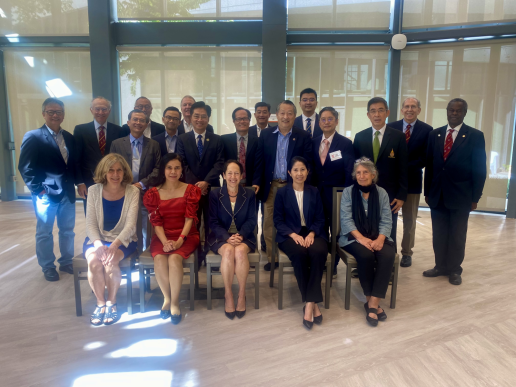Health Professions Education in Asia: Challenges, Innovations, and Opportunities

CMB convened a “Workshop on Health Professions Education in Asia” with trustees, staff, and invited colleagues from Asia in order to survey recent challenges, innovations, and opportunities in the field of health professions education and to gain insights from recent work of our Asian colleagues. The half-day workshop took place on November 2, 2022, immediately preceding the International Conference on the Future of Health Professions Education, held on the University of Miami campus. Workshop presentations reflected some of the ways in which the recommendations of the Lancet Commission on Health Professional Education for the 21st Century, detailed in its 2010 report, had catalyzed action to strengthen development of the health workforce.
Among the innovations highlighted were the following:
Thailand – expanding rural healthcare. Suwit Wibulpolprasert, Wanicha Cheunkongkaew, Jiruth Sriratanaban described innovations taken to expand healthcare to rural areas. For example, all medical school graduates educated at public universities are required to spend a year working in a rural hospital after earning their medical degree. The government is placing a stronger emphasis on rural recruitment, local training, and hometown placement of doctors, nurses, and other health professions. A one-year program has been developed to train village health volunteers as nurse practitioners. Since the introduction of the Primary Care System Act of 2019, Thailand has been devoting more resources to train primary care physicians to meet increasing demand for their services.
Viet Nam – curricular reform. Tran Diep Tuan and Vuong Thi Ngoc Lan of the University of Medicine and Pharmacy at Ho Chi Minh City (UMP-HCMC) discussed steps their institution has taken to develop a competency-based education model. Key features of the reformed curriculum include a student-centered approach; emphasis on primary care, professionalism, and interprofessional education; more practice-based training; and expansion from hospital-based to hospital- and community-based practice. Sustaining these reforms – first introduced in 2016 – will require investment in faculty development and follow-up with students to assess whether they attained the competencies required for their professional practice.
Viet Nam, Cambodia, and Lao PDR – collaborative learning. David Duong, Director of the Harvard Medical School Program in Global Primary Care and Social Change, described a CMB-supported project to create a regional learning collaborative network focused on Viet Nam, Cambodia, and Lao PDR. The goals are to promote collaborative learning on competency-based medical education (CBME); form a regional community of educators to advance CBME; generate frameworks on specific CBME principles and their application; and share best practices and lessons learned. Starting with small-scale education change projects, the project will give teams from each of the three participating universities experience and confidence in their capacity to introduce reforms.
CMB staff added overviews of CMB programming to the discussion. Le Nhan Phuong reported on the Equity Initiative, with a particular emphasis on how Fellows are applying their enhanced understanding of equity to their work and to building communities of practice, and Matthew Wang described steps the China Consortium of Elite Teaching Hospitals has taken to develop, pilot, and promote new pedagogical practices for graduate medical education in China.
Participants encouraged CMB to continue its support for health professions education, particularly in terms of scaling change, connecting leaders in Asia to their global counterparts, and using its social and intellectual capital to mobilize resources.
Slide presentation can be found below:
The Equity Initiative: A Lifelong Fellowship Journey (Equity Initiative Staff)
Supporting Quality Graduate Medical Education in China (CMB Beijing Office Staff)
